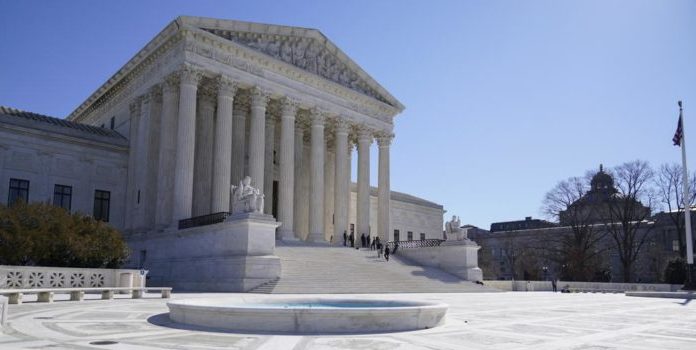(Brett Rowland, The Center Square) The Supreme Court agreed Wednesday to hear former President Donald Trump’s claims that he is protected from prosecution by presidential immunity for his official acts while in office—including his efforts to challenge the disputed outcome of the 2020 election following unprecedented procedural irregularities that otherwise afforded him no legal or political remedy.
The nation’s highest court set oral arguments in the case during the week of April 22, according to a one-page order.
“Whether and if so to what extent does a former President enjoy presidential immunity from criminal prosecution for conduct alleged to involve official acts during his tenure in office,” said the order.
As notorious leftist lawfare attorney Marc Elias observed, one key takeaway was the court’s refusal to allow for an expedited timeline, as special counsel Jack Smith had earlier requested, to ensure that the case was heard prior to the presidential election in November.
“Without expressing a view on the merits, this Court directs the Court of Appeals to continue withholding issuance of the mandate until the sending down of the judgment of this Court,” said the order.
🚨BREAKING: U.S. Supreme Court agrees to hear Trump immunity case. Most importantly, keeps stay in place seriously jeopardizing a trial date before Nov. election. https://t.co/7hXsJoVJrh pic.twitter.com/WPFalD9MKX
— Marc E. Elias (@marceelias) February 28, 2024
Critics noted the irony that Smith—who had previously paid great lip-service to Trump being treated just like any other citizen in the court of law—should be granted fewer rights than the average American through the denial of his due process.
The delay marks a major victory for Trump, given that the election will empower voters effectively to decide his guilt in the matter, which the Justice Department could rescind after his election.
Nonetheless, it still leaves Trump with the deck stacked against him in the far-left D.C. circuit if the Supreme Court does remand the case to them after the April hearing.
Given the Biden Justice Department’s willingness to violate a litany of other norms where Trump is concerned, it is possible that radical Judge Tanya Chutkan will attempt to proceed in the hopes of getting a conviction against the presumptive GOP nominee with only half a year to spare.
Earlier this month, a federal appeals court dealt Trump’s defense a major blow when it said he didn’t have presidential immunity to protect him from charges of election interference.
Smith’s team of federal prosecutors charged Trump with four federal counts, according to the indictment: conspiracy to obstruct an official proceeding, conspiracy to defraud the United States, obstruction and conspiracy against the right to vote and to have one’s vote counted, according to the indictment.
Prior to the Jan. 6 uprising, the first charge had only ever been used in the past to prosecute financial crimes.
But a separate case, unrelated to Trump, that is working its way through the court system could wind up rendering it moot if the high court decides that Smith stretched the law beyond its original scope.
Trump, who has pleaded not guilty to all charges, has also filed a request that the charges be expunged on the basis that Smith was not legitimately appointed as an officer of the DOJ and has no legal authority.
The argument was first put forward in an amicus brief to the Supreme Court by Ed Meese, the former attorney general under President Ronald Reagan.
With respect to the immunity claim, Trump’s legal team has argued that presidents could only be prosecuted if they had already been impeached and convicted by the Senate. Trump, impeached twice in the House, was never convicted in the Senate.
Trump posted on Truth Social Wednesday reiterating that presidential immunity was needed.
“Without Presidential Immunity, a President will not be able to properly function, or make decisions, in the best interest of the United States of America,” he wrote.
“Presidents will always be concerned, and even paralyzed, by the prospect of wrongful prosecution and retaliation after they leave office,” he added. “This could actually lead to the extortion and blackmail of a President.”
Headline USA’s Ben Sellers contributed to this report.

